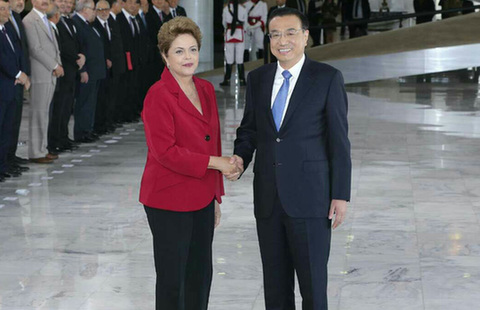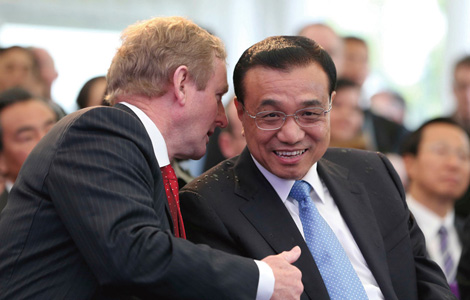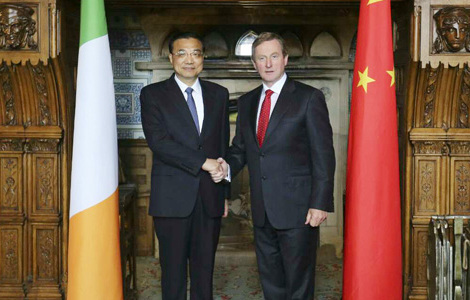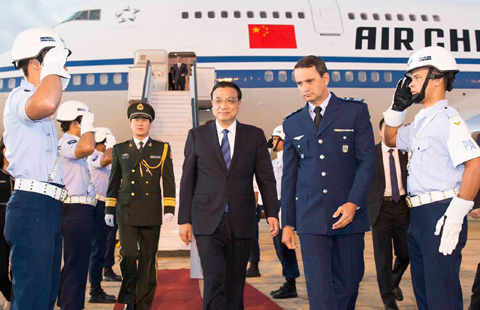China, US pay attention to Korean Peninsula
Updated: 2015-05-19 09:42
By CHEN WEIHUA in Washington(China Daily USA)
|
||||||||
China called for more efforts to ease tensions on the Korean Peninsula as US Secretary of State John Kerry traveled in the region, indicating more sanctions on the Democratic People's Republic of Korea.
Hong Lei, the Chinese foreign ministry spokesman, said on Monday that China always calls for commitment to denuclearization, peace and stability for the peninsula, as well as a peaceful settlement of the issue through dialogue and consultation.
"The current situation on the peninsula is complex and sensitive; we hope that more efforts will be made to ease the tension and resume the Six-Party Talks," Hong told reporters in a daily briefing.
The Six-Party Talks to denuclearize the Korea Peninsula, suspended since 2009, involve South Korea, North Korea, China, the US, Russia and Japan.
In Seoul on Monday, Kerry said that the US continued to offer North Korea the chance for an improved relationship in return for signs of a genuine willingness to end its nuclear program.
"To date, to this moment, particularly with recent provocations, it is clear the DPRK is not even close to meeting that standard," Kerry told a joint press conference with South Korean Foreign Minister Yun Byung-se.
"Instead it continues to pursue nuclear weapons and ballistic missiles," he said.
Kerry arrived in Seoul on Sunday afternoon for a two-day trip after visiting Beijing over the weekend. His visit came amid rising tensions on the peninsula, as the DPRK said on May 9 that it had successfully test-fired a submarine-launched ballistic missile.
Kerry said the missile launch was provocative and in violation of the United Nations Security Council resolution banning the DPRK from conducting any launches based on its ballistic missile technology.
He indicated further sanctions against the DPRK, saying that the US and partner nations were talking about the next steps in response to Pyongyang's "reckless abandonment" of obligations under UN resolutions.
Kerry described Washington and Seoul as having no difference in their approach to Pyongyang's "provocations and its nuclear program".
Ted Carpenter, a senior fellow in defense and foreign policy studies at Cato Institute, a think tank based in Washington, said more sanctions will not accomplish anything positive.
"They will only make Pyongyang feel more beleaguered, and therefore, cause Kim Jong-un's government to become even less cooperative," he told China Daily on Monday.
Carpenter said he is not optimistic about the Six-Party Talks achieving much either. "North Korea seems to be progressing steadily toward building a small but credible nuclear arsenal," he said. "The United States, China and other countries in East Asia may have to learn to live with that result, as unpleasant as the prospect might be," he said.
Carpenter believes the best option for defusing tensions would be to conduct meaningful bilateral talks between the US and the DPRK that would address the entire range of problems between the two countries. He said the goal would be for such talks to produce official diplomatic ties and result in initial steps toward an overall normal relationship.
"Washington has sought to isolate North Korea for decades, and that strategy has utterly failed to achieve the desired results," he said. "US leaders should try a new strategy based on seeking a wide-ranging dialogue with Pyongyang. That approach seems to be working with Cuba; it is at least worth a try with North Korea."
Scott Snyder, a senior fellow for Korea studies and director of the program on US-Korea policy at the Council on Foreign Relations, said that although there may be some disagreement between the US and China on how to get DPRK to do what needs to be done, there is no disagreement between the US and China on what needs to be done.
"There is disagreement between North Korea and the US/China regarding North Korea's willingness to do what all six parties had agreed in September of 2005 must be done in order to achieve a denuclearized Korean Peninsula," he said.
"Unless DPRK is willing to enter dialogue with a will to denuclearize, it is unlikely that there will be a return to negotiations," Snyder said.
Xinhua News Agency contributed to the story.

 Premier Li Keqiang welcomed by Brazilian president
Premier Li Keqiang welcomed by Brazilian president
 Weirdest towns in the world
Weirdest towns in the world
 Students from vocational schools also make big bucks
Students from vocational schools also make big bucks
 Ten photos you don't wanna miss - May 19
Ten photos you don't wanna miss - May 19
 Royal family adds color to Chelsea Flower Show
Royal family adds color to Chelsea Flower Show
 Premier takes in Irish countryside at old farm
Premier takes in Irish countryside at old farm
 China, Ireland sign agricultural deals
China, Ireland sign agricultural deals
 Premier Li arrives in Brazil to start official visit
Premier Li arrives in Brazil to start official visit
Most Viewed
Editor's Picks

|

|

|

|

|

|
Today's Top News
Brazil embraces third wave of Chinese investment
Taoist teaches US official one or two things about feng shui
White House bans police from using certain military equipment
China eyes 'capacity exports' to sustain growth
Vietnam's objection to fishing ban in South China Sea dismissed
Li arrives in Brasilia to start LatAm tour
In Brazil's capital, young weigh what China offers
Li samples products of an Irish farm
US Weekly

|

|






